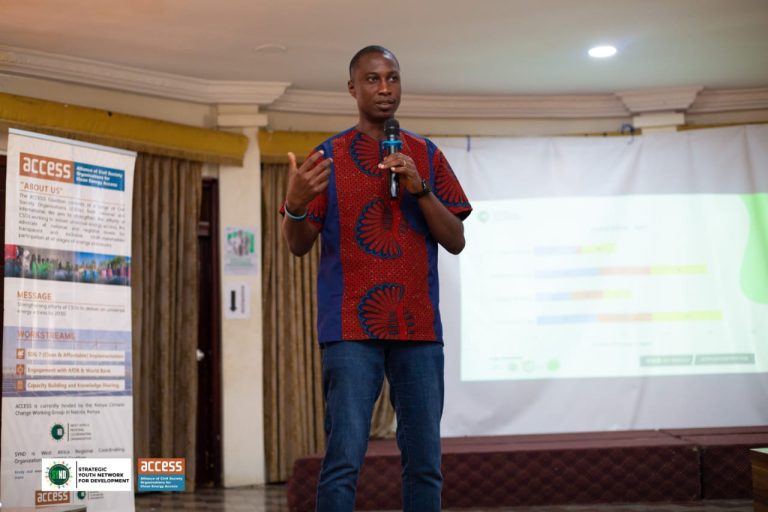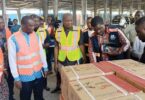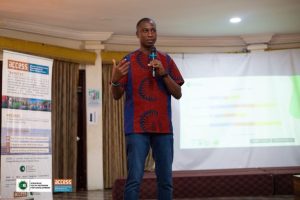
Executive Coordinator-SYND Chibeze Ezekiel
Story By: Ishmael Barfi
Young people in the Renewable Energy space in Ghana have called for more advocacy on the importance of reliable and affordable renewable energy across the country.
According to the young people, advocacy for reliable and affordable renewable energy is important in attaining the Sustainable Development Goals (SDG) 7 which talks about universal access to energy services.
The call by the young people is in response to the low advocacy on reliable and affordable energy, in the country.
They made the call at a capacity-building workshop on the World Bank’s regulatory indicators for sustainable energy(rise) mechanism held on 10th November,2023 in Accra.
The One-day Capacity building was organized by the Alliance of Civil Society Organization for Clean Energy (ACCESS) Ghana in collaboration with Strategic Youth Network Development (SYND) and Youth in Renewable Energy Ghana (Youth-REG).
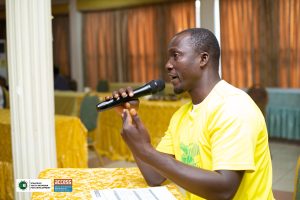
A young participant at the One day workshop
The young people at the capacity building workshop comprised representatives of Civil Society Organisations (CSOs) from the various regions in Ghana working tirelessly to ensure universal energy access by advocating at national and regional levels for transparent and inclusive multi-stakeholder participation at all stages of energy processes
Furthermore, they had the opportunity to share knowledge and expertise across the membership base of practitioner experience in different regions.
Delivering a presentation on the current performance of countries under the World Bank Rise mechanism, the Executive Coordinator of the Strategic Youth Network for Development-Ghana (SYND-GH) Mr. Chibeze Ezekiel explained that, the World Bank’s RISE mechanism are set of indicators used to compare national policy and regulatory frameworks for sustainable energy.
In the course of comparison, the Rise mechanism assesses countries’ policy and regulatory support for each of the four pillars of sustainable energy namely access to electricity, access to clean cooking, energy efficiency, and renewable energy.
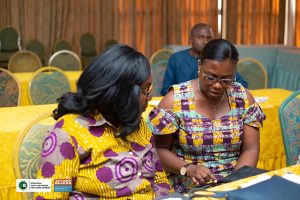
Some representatives from the renewable energy sector
This he said is measured by over 30 indicators covering 140 countries and representing over 98 percent of the world population.
These indicators he noted help national policymakers benchmark the energy sector framework against regional and global peers by classifying countries into a green zone for strong performers in the top third of the 0-100 score range, a yellow zone for middle-third performers, and a red zone for weaker performers in the bottom third.
“Each indicator targets an element of the policy important to mobilizing investment such as establishing planning processes and institutions, introducing dedicated incentives or support programs, and ensuring financially sound utilities” he emphasized.
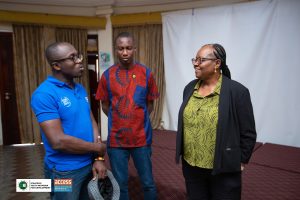
Executive & Deputy Coordinators-SYND Chibeze Ezekiel & Solomon Yamoah respectively interacting with ACCESS Representative
Adding that the pillars under rise are electricity access, clean cooking, renewable energy, and energy efficiency.
In his conclusion, Mr. Chibeze Ezekiel was of the view that the overrating of Ghana to Senegal and Nigeria in 2022 indicated that Ghana was doing better than both countries in terms of the pillars however, asked for more room for improvement.
Strategic Youth Network for Development-Ghana, a youth-driven Non-Governmental Organization (NGO) that dives into issues relating to Climate Change through the provision of platforms to young people to engage policymakers, institutions, and other relevant stakeholders in the climate change space.
Also currently the organization hosting the Alliance of Civil Society Organization for Clean Energy (ACCESS) Secretariat in Africa.
Source: www.thenewindependentonline.com


